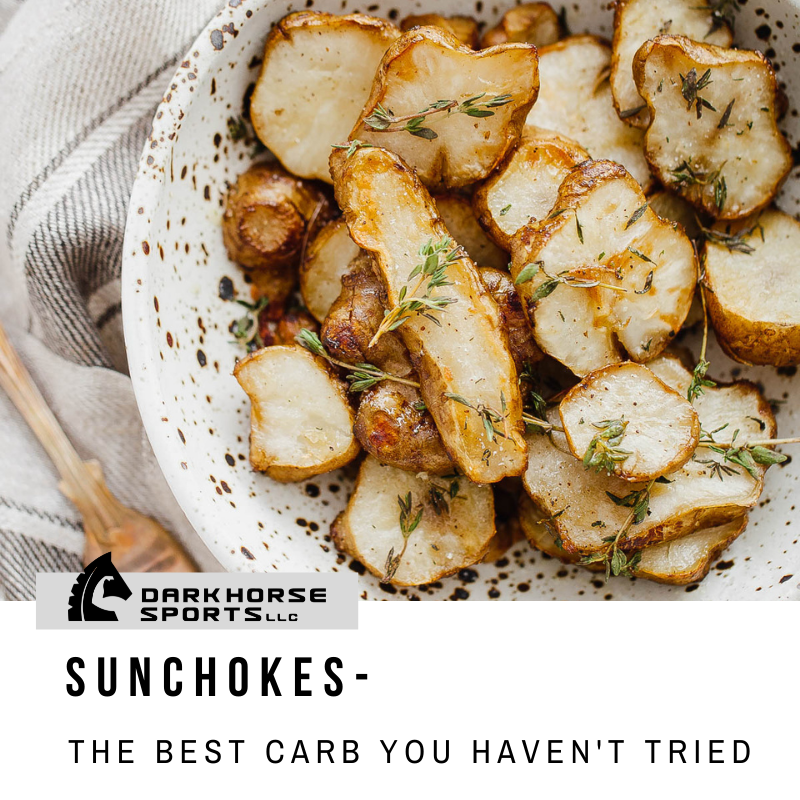|
Like potatoes? Meet the new Carb that is better... You've probably never heard of much less tasted Sunchoke before. It's not necessarily a popular vegetable yet.
But Sunchokes deserve your attention. What Is a Sunchoke? Well it's not a ginger root although it looks really similar to one. It’s not a Jerusalem artichoke although it sounds similar. And it's not even from Jerusalem. It seems that the confusion arose from the mispronunciation of the the Italian word for sunchoke. “girasole” (pronounced "jeer-uh-SOLE-ay"). So you add what sounds like Jerusalem plus it has “choke” in it and it doesn't taste like an artichoke... And there you have it, a case of miss pronounced identity. Sunchokes are actually the tuberous roots of a sunflower plant. The white flesh of the Sunflower Choke is crunchy and crisp. They have a wonderful and intensely nutty and sweet flavor. Once cooked or roasted, their texture resembles that of a creamy potato. They’re delicious and worth seeking out, especially during the fall and winter months, But we wanted to give you the idea a little earlier so you have time to prep. Why So Healthy? Nutritionally speaking, sunchokes are incredibly good for you. They are very high in iron, potassium, and indigestible fiber (prebiotics, specifically inulin) and are a wonderful low-carb (and lower calorie) alternative to potatoes or other higher-carb root vegetables. The reason that sunchokes are similar to, but better than, potatoes is that the carbohydrate present is inulin rather than starch which is an excellent source of fructose for diabetics. How to Cook Sunchokes Sunchokes can be served raw, roasted, fried, pureed into soups, or steamed. Basically any way you would use a potato or a carrot. They can be substituted for these vegetables in most dishes as well. You can even make “Potato” chips out of them. There are two things that you should note about sunchokes though. Think of these as “Safety” tips 1. Don’t eat a ton all at once. Part of what makes Sunchokes so healthy is also what makes them a little dangerous. Inulin. Sunchokes are a high source of inulin, which can cause stomach discomfort for some people, especially if eaten in large quantities. 2. Use them within a week. Similarly to celery root, sunchokes will oxidize when sliced, so it’s best to use them right away or store them in acidulated water (water with the juice of one lemon) if not using immediately. If you are new to sunchokes then here is a simple recipe that we like. Roasted Sunchokes Roasted sunchokes are sliced and tossed with olive oil, salt, pepper, and roasted until caramelized and tender. An easy and healthy vegetable side dish for fall or winter! Note: Sunchokes are a high source of inulin, which can cause stomach discomfort for some people, especially if eaten in large quantities. Ingredients
Instructions 1. Preheat the oven to 425° Fahrenheit (220°C) with a rack in the center position. In a medium bowl, toss the sunchokes slices with the olive oil, salt, and pepper until well coated. Distribute the sunchokes, cut-side down in an even, thin layer on a half sheet pan. Be sure to leave space between them, as this will help them caramelize evenly. 2. Roast for 18 to 22 minutes, flipping the pieces halfway through, or until the sunchokes are lightly caramelized and fork tender. 3. Gently toss the roasted sunchokes with freshly chopped thyme leaves and a light sprinkle of kosher salt. I like to drizzle them lightly with extra virgin olive oil before serving, but this is optional. Serve immediately. Tips For Success:
So now go try Sunchokes this week and tell us what you think! Enjoy, Cheers! References: https://www.abeautifulplate.com/roasted-sunchokes/ https://www.seriouseats.com/what-are-sunchokes https://www.cookinglight.com/food/in-season/what-are-sunchokes https://www.melissas.com/products/sunflower-chokes-sunchokes
0 Comments
Leave a Reply. |
Archives
November 2023
|
Services |
Company |
|
|
© COPYRIGHT 2015. ALL RIGHTS RESERVED.
|
Website by My Personal Trainer Website
|


 RSS Feed
RSS Feed




